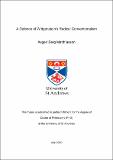Files in this item
A defence of Wittgenstein’s radical conventionalism
Item metadata
| dc.contributor.advisor | Sullivan, Peter M. | |
| dc.contributor.advisor | Wright, Crispin | |
| dc.contributor.author | Matthíasson, Ásgeir Berg | |
| dc.coverage.spatial | xix, 256 p. | en_US |
| dc.date.accessioned | 2021-02-24T08:23:14Z | |
| dc.date.available | 2021-02-24T08:23:14Z | |
| dc.date.issued | 2021-06 | |
| dc.identifier.uri | https://hdl.handle.net/10023/21498 | |
| dc.description.abstract | The first part of this thesis develops a game-theoretic solution to the rule-following paradox, based on Wittgenstein's suggestion in the Philosophical Investigations that to follow a rule is a practice. I introduce the notion of a basic constitutive practice which I argue can account for the correctness conditions of rule-following and meaning, for indefinitely many cases and without circularity, by identifying correctness with a point on a correlated equilibrium of such a practice. The solution crucially relies on, and makes precise, the Wittgensteinian concepts of training, agreement in judgement and our form of life. In the second part of the thesis, this solution to the paradox is applied to the problem of mathematical truth. I argue that the essence of Dummett's reading of Wittgenstein as a radical conventionalist is not Dummett's emphasis on decision, but rather the contrast with more moderate forms of conventionalism, whereby an unreduced notion of consequence is appealed to in order to move from stipulated truths to further, more remote truths. Instead of this picture, the radical conventionalist view holds that each truth is a direct expression of the convention and that there is no external criterion at all for the correctness of each step in a mathematical proof except our own practice. By then identifying mathematical correctness with correctness in basic constitutive practices the view is able to avoid the problems that dogged moderate forms of conventionalism, e.g. Quine's regress problem, as the game-theoretic structure of such practices is able to define correctness for indefinitely many cases without appealing to anything outside itself. Finally, I argue that thus put, common and forceful arguments against radical conventionalism can be answered and conclude that it remains a viable view in the philosophy of mathematics. | en_US |
| dc.description.sponsorship | "Work on this thesis has received funding from the European Union's Horizon 2020 Research and Innovation programme under Grant Agreement no. 675415." -- Funding | en |
| dc.language.iso | en | en_US |
| dc.publisher | University of St Andrews | |
| dc.subject | Philosophy of mathematics | en_US |
| dc.subject | Rule-following paradox | en_US |
| dc.subject | Ludwig Wittgenstein | en_US |
| dc.subject | Radical conventionalism | en_US |
| dc.subject.lcc | QA8.4M288 | |
| dc.subject.lcsh | Wittgenstein, Ludwig, 1889-1951 | en |
| dc.subject.lcsh | Mathematics--Philosophy | en |
| dc.title | A defence of Wittgenstein’s radical conventionalism | en_US |
| dc.type | Thesis | en_US |
| dc.contributor.sponsor | Horizon 2020 (Programme) | en_US |
| dc.type.qualificationlevel | Doctoral | en_US |
| dc.type.qualificationname | PhD Doctor of Philosophy | en_US |
| dc.publisher.institution | The University of St Andrews | en_US |
| dc.publisher.department | The University of Stirling | en_US |
| dc.identifier.doi | https://doi.org/10.17630/sta/33 | |
| dc.identifier.grantnumber | 675415 | en_US |
This item appears in the following Collection(s)
Items in the St Andrews Research Repository are protected by copyright, with all rights reserved, unless otherwise indicated.

